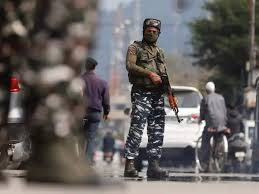Arrested for ‘spying’: Pakistan officers posed as journalists, got key info from CRPF ASI, finds probe

Indian security agencies uncovered a troubling espionage case involving a Central Reserve Police Force (CRPF) officer who spied for Pakistan. Pakistani intelligence officers pretended to be journalists to trick the officer into revealing sensitive information. This incident highlights the ongoing threat of covert operations targeting India’s security forces.
How the Case Emerged
Security agencies noticed unusual leaks about troop movements and political activities in Jammu and Kashmir (J&K). They began investigating Assistant Sub-Inspector Moti Ram Jat, a CRPF officer stationed in J&K. The inquiry revealed that he had shared classified details with people posing as journalists. These operatives gained his trust over time and paid him to get information. The officer reportedly received ₹3,500 monthly and extra sums for critical details.
What Information Was Leaked
Jat passed on extremely sensitive intelligence. This included Union Home Minister Amit Shah’s visits to the region, plans to close tourist spots, troop deployments, and suspected terrorist hideouts. Such information is highly valuable to enemy agents. It threatens the safety of security personnel on the ground. Knowing troop movements can help terrorists avoid patrols or plan attacks. The leak, which occurred repeatedly over two years, exposed serious gaps in security measures.
The Espionage Tactics Used
The Pakistani officers used a clever disguise as journalists. In conflict zones, journalists regularly interact with security personnel to gather news. The spies exploited this access to build credibility. They used a classic espionage tactic called “honey trapping” — luring someone with money and attention. The operatives created a friendly relationship with Jat, making him dependent on them financially and emotionally. This weakened his loyalty and led to his betrayal.
Investigation by the National Investigation Agency
The National Investigation Agency (NIA) quickly took charge of the investigation. They aim to uncover the full scope of the espionage and identify any other insiders. The NIA is also tracing the Pakistani network behind the operation. Jat was dismissed from service for violating rules and betraying the country. The agency continues to probe whether others helped or knew about the spying.
What This Means for India’s Security
This case shows how persistent and creative enemies remain in gathering intelligence. Pakistan’s use of fake journalists reveals the lengths adversaries go to weaken India’s security. It also points out vulnerabilities in personnel training and monitoring. Security experts stress the need for thorough background checks and constant vigilance among officers. They must resist temptations like money or flattery to protect classified information.
Moreover, the case highlights the need for clear boundaries between media and security forces. While both must interact for transparency, strict rules should govern these contacts. Journalists must also verify the identity of their sources to avoid being exploited by spies.
Espionage in Conflict Zones
Espionage is a common tool in asymmetric warfare, especially in conflict-prone areas like J&K. Enemies use various methods like cyberattacks, infiltration, and disguises to collect intelligence. Such breaches risk missions, lives, and trust within security forces. Therefore, building a culture of integrity and awareness is crucial.
Steps Forward
India’s security agencies are expected to take these actions:
- Stricter Vetting: Conduct detailed background checks for sensitive positions.
- Training: Provide regular counterintelligence training to educate officers about spy tactics.
- Monitoring: Track suspicious contacts and communications carefully.
- Strong Laws: Enforce tough penalties for espionage to deter others.
- Media Protocols: Develop safe and clear guidelines for security-media interactions.
The arrest of the CRPF ASI sends a strong message: security personnel must stay alert to protect national interests. As India faces complex geopolitical challenges, securing intelligence and maintaining trust in its forces remain top priorities.






